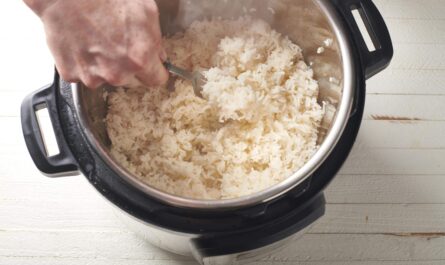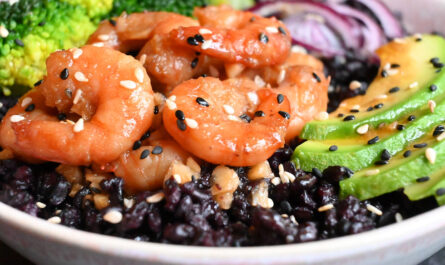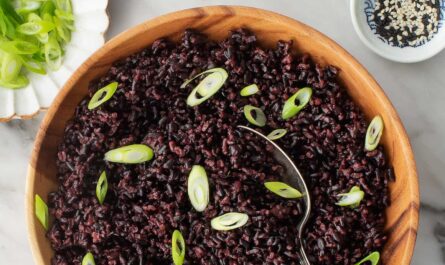In recent years, black rice has emerged as a superfood, capturing the attention of health enthusiasts and food lovers alike. With its rich nutritional profile, it’s no wonder why this ancient grain is gaining popularity, especially among sushi lovers. But what makes black rice so special? And how does it relate to insulin resistance? Understanding the relationship between black rice and insulin resistance is crucial for those looking to make healthier dietary choices. In the world of sushi, where rice is a staple, opting for black rice can be a game changer.

What is Black Rice?
Often referred to as ‘forbidden rice,’ black rice is a variety that boasts a deep purple-black hue. This unique color is due to its high anthocyanin content, which is the same antioxidant found in blueberries and blackberries. Unlike white rice, black rice retains its bran layer, making it a whole grain that’s packed with nutrients.
Nutritional Profile
The nutritional benefits of black rice are impressive. It is rich in fiber, antioxidants, and essential amino acids. It also contains vitamins and minerals such as iron, vitamin E, and zinc. This nutrient-rich profile makes it an ideal choice for those looking to improve their overall health.
Understanding Insulin Resistance
Insulin resistance occurs when the body’s cells become less responsive to insulin, a hormone that regulates blood sugar levels. This condition can lead to elevated blood sugar levels and is often a precursor to type 2 diabetes. Managing insulin resistance through diet and lifestyle changes is crucial to preventing the onset of diabetes and associated health complications.
Link Between Diet and Insulin Resistance
Diet plays a significant role in managing insulin resistance. Foods that are high in fiber and low in glycemic index can help regulate blood sugar levels. This is where black rice comes into play, offering a healthier alternative to traditional white rice.
How Black Rice Helps with Insulin Resistance
The benefits of black rice in managing insulin resistance are largely attributed to its high fiber content and low glycemic index. The fiber in black rice helps slow down the absorption of sugar, leading to more stable blood sugar levels. Additionally, the antioxidants in black rice help reduce inflammation, which is often associated with insulin resistance.
Research and Studies
Several studies have highlighted the potential benefits of black rice in managing insulin resistance. According to research published by Credevo, consuming black rice can improve insulin sensitivity and lower fasting blood sugar levels.
Incorporating Black Rice into Your Diet
For sushi lovers, incorporating black rice into your diet can be both delicious and beneficial. Its slightly nutty flavor and chewy texture make it a perfect addition to various dishes, including sushi rolls. You can explore creative ways to include this superfood in your meals by checking out black rice recipes.
Preparing Black Rice
Cooking black rice is simple. Rinse the rice thoroughly and combine it with water in a 1:2 ratio. Bring it to a boil, then simmer until the rice is tender and the water is absorbed. This process ensures you retain the maximum nutrients and flavor.
Black Rice and Sushi
For sushi enthusiasts, using black rice can add a unique twist to traditional sushi dishes. Its distinct color and flavor profile not only make the sushi visually appealing but also enhance its nutritional value. Try pairing it with fresh vegetables and seafood for a wholesome meal.
Black Rice Sushi Recipes
Looking to get creative in the kitchen? Check out some delicious black rice sushi recipes for inspiration.
Health Benefits of Black Rice
Apart from its role in managing insulin resistance, black rice offers a myriad of health benefits. Its antioxidant properties help combat oxidative stress, while its fiber content supports digestive health. For a comprehensive understanding, explore the health benefits of black rice.
Conclusion
Incorporating black rice into your diet can be a strategic move towards better health, particularly for managing insulin resistance. As sushi lovers seek healthier alternatives, black rice offers a flavorful, nutritious, and visually stunning option. Embrace this ancient grain and enjoy the benefits it brings to your culinary and health journey.

FAQs
Is black rice better than white rice for insulin resistance?
Yes, black rice is considered better due to its high fiber content and low glycemic index, which help manage blood sugar levels more effectively than white rice.
Can I use black rice in all sushi recipes?
Absolutely! Black rice can be used in most sushi recipes, adding a unique flavor and nutritional boost to traditional options.
Does black rice taste different from white rice?
Black rice has a slightly nutty flavor and a chewy texture, which sets it apart from the more neutral taste of white rice.
This article contains affiliate links. We may earn a commission at no extra cost to you.




